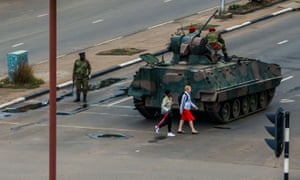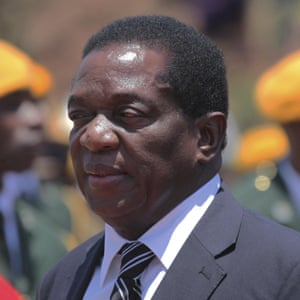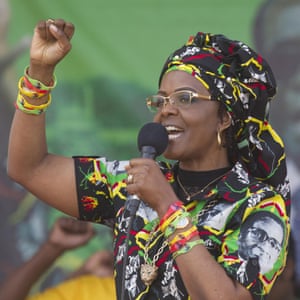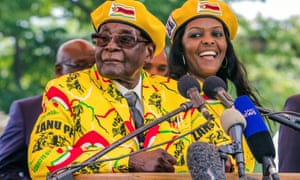Source: Robert Mugabe in detention after military takes control of Zimbabwe | World news | The Guardian
Robert Mugabe remains in detention at his home in Zimbabwe more than 12 hours after the military declared on national television that it had temporarily taken control of the country to “target criminals” around the head of state.
The move by the armed forces appears to have resolved a bitter battle to succeed the 93-year-old president, which had pitted his former vice-president, Emmerson Mnangagwa, against Mugabe’s wife, Grace.
Mnangagwa was reported to have returned to Zimbabwe on Tuesday evening from South Africa, where he fled last week after being stripped of his office by Mugabe in an apparent attempt to clear Grace Mugabe’s path to power.
There were unconfirmed reports that Grace was in Namibia on Wednesday on business.

The military takeover comes two days after the army chief – flanked by other senior officers – said he was prepared to “step in” to end turmoil in the ruling Zanu-PF party.
It is likely to signal the departure from power of the world’s oldest leader within days, weeks or at most months.
One high-profile opposition leader said there was “a lot of talking going on”, with the army reaching out to them to discuss the formation of a transitional government after Mugabe steps down.
Negotiations had been ongoing for several months with “certain people within the army”, a second senior opposition official said.
The official said Mugabe would resign this week and be replaced by Mnangagwa, with opposition leaders taking posts as vice-president and prime minister. There was no independent confirmation of his claim.
Zimbabwe’s fragmented opposition has not publicly condemned the military move. Nelson Chamisa, the deputy head of the opposition MDC party, called for “peace, constitutionalism, democratisation, the rule of law and the sanctity of human life”.
Tendai Biti, an opposition leader, called for a “roadmap back to legitimacy”.
“What is key is that a traditional authority is set up which is inclusive with the opposition and the ruling party … We need a dialogue too with [regional organisations], the African Union and the United Nations. We can’t solve this problem on our own,” Biti said.
Profile
Who is Emmerson Mnangagwa?

Emmerson Mnangagwa was Zimbabwe’s powerful vice-president until 6 November, when he was fired by Robert Mugabe.
The 75-year-old former intelligence chief had been locked in a battle with the first lady, Grace Mugabe, to succeed her husband as president. In October she publicly denied poisoning him after he fell ill at a rally in August.
After his sacking, which was seen as an attempt to clear Grace Mugabe’s path to power, Mnangagwa fled to South Africa. He reportedly returned on 14 November as the military prepared to take over the country, and is firm favourite to become Zimbabwe’s next leader.
He has strong support within the security establishment and among veterans of Zimbabwe’s 1970s guerrilla war, when he earned the nickname “the crocodile”.
Despite his alleged involvement in atrocities in the 1980s, Mnangagwa is the preferred candidate of much of the international community, which sees him as being the most likely to guarantee a stable transition and implement economic reforms.
South Africa appears to be backing the takeover and sent ministers as envoys on Wednesday morning. The South African president, Jacob Zuma, said in a statement that he had spoken to Mugabe, who he said had confirmed he was “confined” but “fine”. Zuma called for calm and a transition in line with the Zimbabwean constitution.
“Although a little bit scary, I think this is good for us. It has been a long time, we are going through a lot of hardships,” a fruit and vegetable seller in the centre of the city said.
“People are excited because they are ready for change,” said an official who asked not to be named because of his job. “I don’t think things will get violent because they are doing this for the people.”
Early on Wednesday, a military spokesman, Maj Gen SB Moyo, made an announcement on state television saying Mugabe and his family were “safe and sound and their security is guaranteed”. Troops seized the network’s offices late on Tuesday night.
Moyo insisted – despite appearances – that a coup had not taken place, adding: “As soon as [the armed forces] are done the situation will come to normalcy.”
There was no sign of any resistance to the takeover or to the arrest of a series of senior officials associated with Grace Mugabe and her G40 faction. The youth wing of the ruling Zanu-PF, which had made defiant statements directed at the military earlier in the week, appeared to condone the military action.
Mnangagwa, a former spy chief, has strong support among many in Zimbabwe’s armed forces, and it is unclear who might oppose him in coming days. In contrast, Grace Mugabe is deeply unpopular and has few allies internally or, crucially, regionally.
Profile
Who is Grace Mugabe and why is she controversial?

Grace Mugabe is the 52-year-old first lady of Zimbabwe. Born in South Africa, she married Robert Mugabe, 40 years her senior, in 1996. Initially struggling to emerge from the shadows of the president’s popular first wife, Sally, who died in 1992, Mugabe appeared by her husband’s side for official functions but rarely got involved in politics herself, focusing publicly on her charity work while gaining a reputation for legendary shopping expeditions.
In 2009 a British photographer alleged that she punched him repeatedly in the face when he tried to take a picture of her in Hong Kong. She has since been implicated in several incidents outside Zimbabwe: in Singapore, in Malaysia and most recently in South Africa, where she allegedly assaulted a model in August.
The unveiling of Grace Mugabe as a potential successor to her husband began in 2014, when she became head of the ruling party’s women’s league and the state propaganda machine began talking up her political acumen. Before the events of 14 November her path to power had received a boost when her main rival, the vice-president , Emmerson Mnangagwa, was fired on 6 November. The feud between Mugabe and Mnangagwa had been bitter – in October she publicly denied poisoning him after he fell ill at a rally in August.
The US embassy in the capital tweeted a message citing “ongoing uncertainty”. A statement posted by the embassy later told US citizens in Zimbabwe to “shelter in place until further notice”. The British embassy said that due to the uncertain political situation British nationals should remain at home.
Evan Marawire, a pastor and one of Zimbabwe’s best-known activists, called on Zimbabweans to “remain calm and hopeful, alert but prayerful”. Marawire, who has been jailed and prosecuted since launching the #thisflag movement last year, which led to huge protests, did not directly condemn or condone the military takeover, but said developments were “the culmination of the work that citizens have been doing”.

Mugabe’s sacking of Mnangagwa came as a shock to many observers. Nicknamed “the crocodile” from his time fighting in the country’s liberation wars, he had been considered the most likely candidate to succeed Mugabe if the president decided to step down or died in office.
Mugabe has systematically dismissed veterans of the liberation struggle from party posts in recent years, leaving the top echelons stacked with officials who did not fight in the independence war. This exacerbated a long-running battle between an old political elite forged in the 1970s and 1980s, and a new generation that coalesced around Grace Mugabe.
War veterans broke ranks with the president in 2016 and have vowed to form a broad front with the opposition to challenge his rule.
Chris Mutsvangwa, the head of the war veterans’ group, told reporters in Johannesburg last week that Grace Mugabe was “a mad woman” who had won power through a “coup … by marriage certificate”.
Mutsvangwa issued a statement from Johannesburg on Wednesday praising the military for carrying out “a bloodless correction of gross abuse of power” that would return Zimbabwe to “genuine democracy”.
Grace Mugabe’s reputation has been tarnished by a series of violent outbursts, including an alleged assault against a model she had found with her sons in a luxury apartment in Johannesburg in September. Granted diplomatic immunityafter the incident, she was allowed to leave South Africa despite a police inquiry, and denies any wrongdoing.
Reports of extravagant purchases, including property in South Africa and a Rolls-Royce, have also angered many Zimbabweans. Pictures of one of the first lady’s sons apparently pouring most of a bottle of champagne over a luxury watch worth tens of thousands of dollars in a nightclub were shared widely on social media this week.
The crisis comes at a time when Zimbabwe faces severe economic problems. The country is struggling to pay for imports due to a shortage of dollars, which has also caused acute cash shortages. State employees, including some soldiers and policemen, have gone for months without payment of their salaries, deepening discontent with the government.
Timeline
Zimbabwe timeline: the week that led to Mugabe’s detention
Robert Mugabe fires his powerful vice-president, Emmerson Mnangagwa, clearing the way for his wife, Grace, to succeed him as leader of Zimbabwe.
Grace had accused 75-year-old Mnangagwa, a former intelligence chief, of being the “root cause of factionalism” in the ruling Zanu-PF party.
Mnangagwa reportedly flees to South Africa, but vows to return to Zimbabwe to lead party members.
The party “is not personal property for you and your wife to do as you please,” Mnangagwa tells Mugabe in an angry five-page statement.
Zimbabwe’s army chief demands a halt to the purge in Zanu-PF, and warns that the military could intervene.
“We must remind those behind the current treacherous shenanigans that when it comes to matters of protecting our revolution, the military will not hesitate to step in,” General Constantino Chiwenga told a media conference attended by about 90 senior army officers.
A convoy of tanks is seen moving on the outskirts of the Zimbabwean capital but the military denies a coup. In an overnight declaration on state television, they say Mugabe is safe and they are “only targeting criminals around him”.
Military vehicles take control of the streets of Harare in the early hours. South Africa says Mugabe has told its president, Jacob Zuma, by telephone that he is under house arrest but is “fine”.

COMMENTS
Mugabe can go back to his old job as spokesman for detainees.
We want peace in Zimbabwe